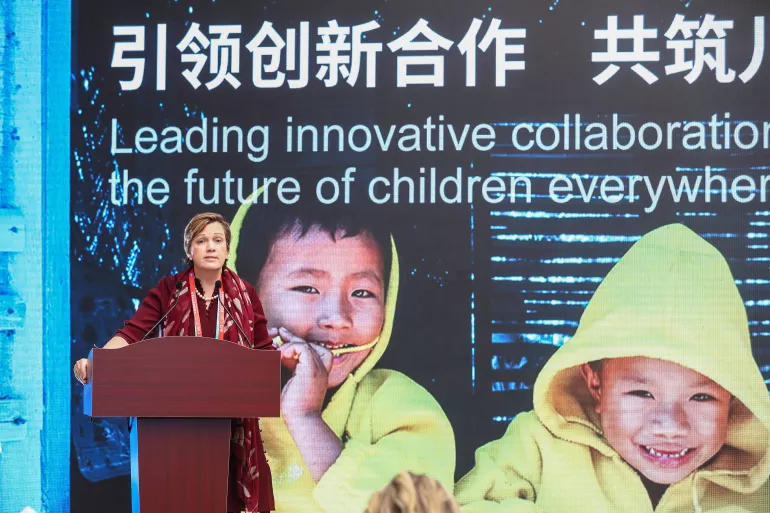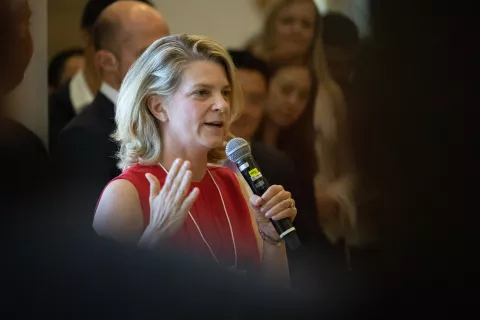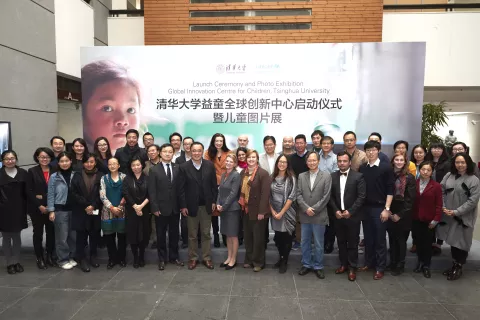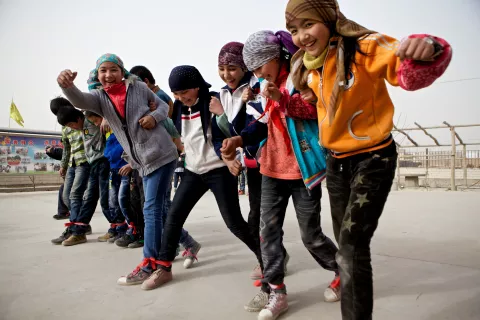Promoting Results for Children through Innovative Solutions
Participants at UNICEF's side event at China's International Import Expo call for increased investment in a healthy and sustainable market for children

- Available in:
- 中文
- English
Shanghai, 6 November 2018 – UNICEF and businesses are teaming up to drive innovation and business acumen to change the lives of children. In a side event of the China International Import Expo (CIIE) held today in Shanghai, participants were inspired to come together to address identified gaps and development challenges in a new partnership with UNICEF – a partnership that is good for business and designed to ensure healthy and productive lives for children around the globe.
The event, titled "Leading Innovative Collaborations to Build the Future of Children Everywhere", was organized by the United Nations Children's Fund (UNICEF) and attracted participants from government, international organizations, global businesses, industry associations, non-profit organizations and academia.
Businesses have a great deal to offer to help address the needs of children and young people through new inventions, products and market reach they bring to the table. Be it as manufacturers of essential commodities, as investors for innovations, as donors, or as employers, they can leverage their core assets to enable every child to survive and reach their full potential.
"If we are to achieve the child-related Sustainable Development Goals, UNICEF and our public-sector partners cannot do it alone," said Ms. Shanelle Hall, UNICEF Deputy Executive Director. "The fact is — we will not reach most of our SDG targets without a significant acceleration [in action, in investments and of inventions]. And an expansion of the involvement of the private sector in meeting the needs of children."
Haier, one of the world's largest electronic groups gave examples of its work on frontier technology to meet the needs of women and children. "Working with UNICEF, WHO and GAVI, we worked to get solar panels to store vaccines to address electricity shortages in remote areas," said Dr. Liu Zhanjie, Executive Director and General Manager of, Qingdao Haier Biomedical. "Now we can ensure the safety of 120,000 such vaccines."
During the panel Global Corporate Affairs Lead of Vaccines at Pfizer, Lindsey Dietschi, mentioned the company's commitment of over 900 million doses of PCV13 to Gavi eligible countries through 2027 and the importance of partnerships to achieve this goal.
Chengdu Institute of Biological Products explained its eight-year process of collaboration with partners and internal capacity building to get the Japanese encephalitis vaccine pre-certified by WHO. "This is an example of the need for collaboration across sectors," said Ms. Yang Lingjiang, Manager, Chengdu Institute of Biological Products. "Now, a total of 420 million doses have been supplied to endemic areas – 45 million of them supplied by UNICEF – helping to control the diseases in endemic countries."
The future for every child to survive and thrive also requires filling a range of gaps in the basket of products that are needed and overcoming global and local market constraints that hamper access. In addition, innovation is essential to create new opportunities and accelerate results for children.
Panelists at the session provided perspectives on this topic and collectively called for healthy, available, affordable and sustainable markets for commodities for children.
While China has made considerable advances in accelerating accessibility of Chinese products to the global market, "there are remaining gaps in the market for medical products for children," said Ms. Meng Dongping, Vice President of the China Chamber of Commerce for Import and Export of Medicines and health Products. "We need to further look at our research and development capacity and quality assurance. And we need organizations with huge supply capacities such as UNICEF to help us close market gaps."
The involvement of young people was also highlighted. The "I Can" initiative founded in 2007 by Professor Zhang Haixia from Peking University now runs innovation contests that gather more than 500 young people. "Young kids have ideas that can change the world," said Professor Zhang. "Our goal is to have every child to feel confidence, have persistence and have dreams. We have to work together to make the world better. Yes, we can!"
As the world's leading organization for children and the largest procurement agency in the United Nations, UNICEF has a long history of partnering with businesses, influencing markets and driving product innovation that has increased children's access to essential commodities and has incentivised businesses to contribute their core assets to the needs of children, as well as to uphold child rights.
"It is highly commendable that UNICEF, since 1979, has been playing a very active role in driving remarkable achievements for children in China and the world," said Mr. Zhang Yi, Deputy Director General of China International Center for Economic and Technical Exchange, Ministry of Commerce. "China will continue to work together with national governments, international organizations – including UNICEF – and the private sector to proactively build a community of shared future for mankind, and achieve the United Nations 2030 agenda for sustainable development. We need not only to bring new products, but to bring new mindsets and long-term solutions."
UNICEF procures and supplies over 5,000 essential commodities from businesses to address the needs of children. In 2017, it procured $3.46 billion worth of supplies and services from all over the world, ensuring high quality and good value through fair and open procurement.
Over the last five years, UNICEF has also been building the ability to drive Research and Development (R&D) for products essential to meet the needs of children that are not yet readily available, in areas such as health, education, water, sanitation and health (WASH), safety and environmental adaptation.
"While businesses have always been a part of UNICEF's story – we want you to be an even bigger part of UNICEF's future. The future of children and a generation of young people – our most important resource. And ultimately, the future of businesses, and countries' economic and social development," said Ms. Hall.
Media contacts
About UNICEF
UNICEF works in some of the world's toughest places, to reach the world's most disadvantaged children. Across 190 countries and territories, we work for every child, everywhere, to build a better world for everyone.
| Visit UNICEF Global website: www.unicef.org Visit UNICEF China website: www.unicef.cn Follow us on Sina Weibo: http://weibo.com/unicefchina Tencent Weibo: http://t.qq.com/unicef Wechat: unicefchina |




